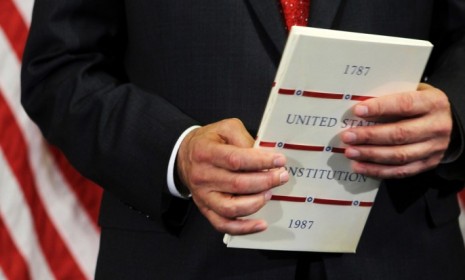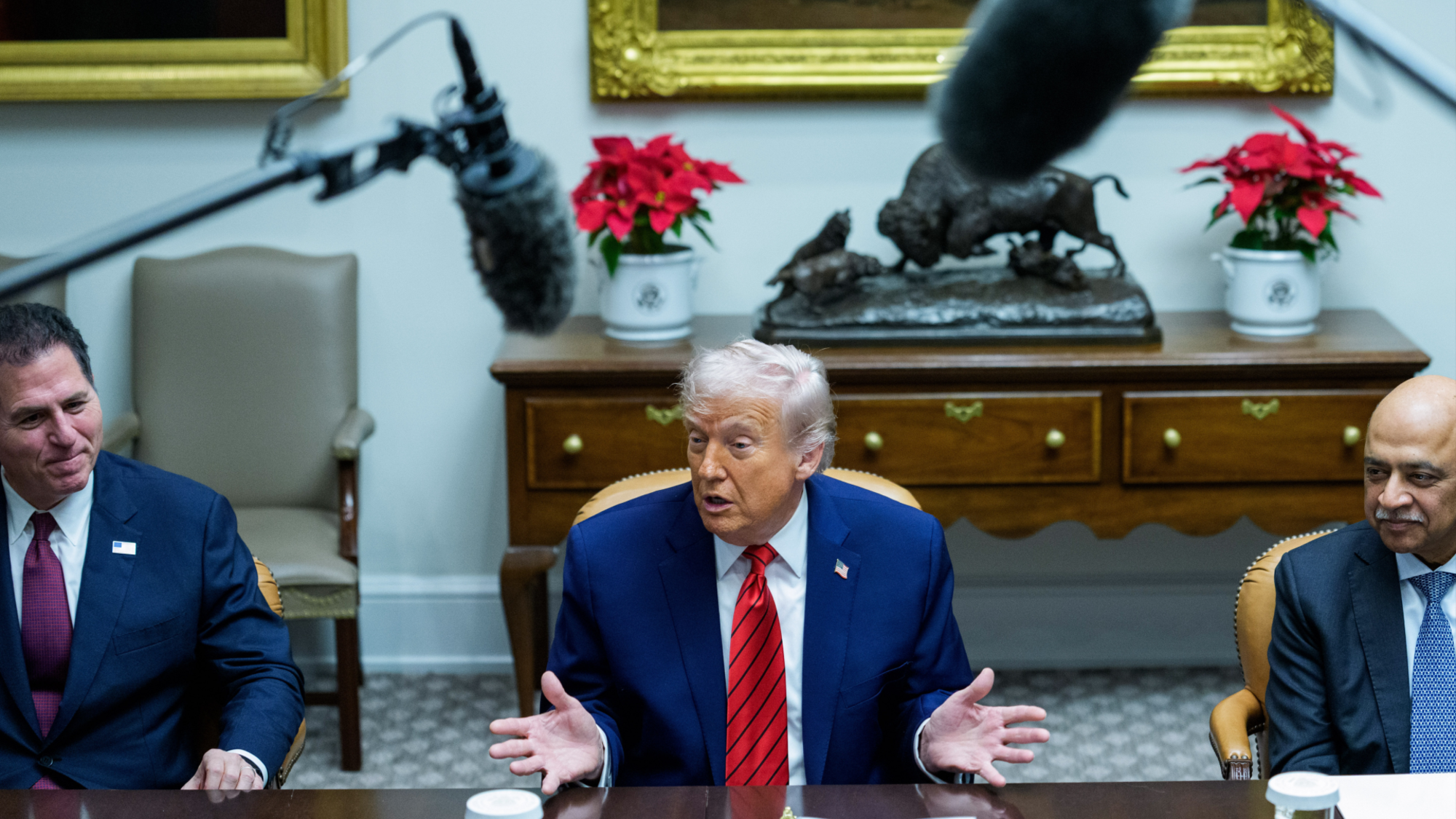5 lessons from the GOP's Constitution recital
What critics took away from the Republicans' symbolic reading of the U.S. Constitution on the House floor

One of the first acts of the 112th Congress this week was to read the U.S. Constitution aloud on the House floor. The idea was cooked up by Rep. Bob Goodlatte (R-VA), as a symbolic way to underline the primacy of the 1787 document for incoming representatives, particularly those elected with the help of Tea Party activists. A bipartisan group of 135 lawmakers took turns reciting passages, with the exception of parts nullified by later amendments. The solemnity of the occasion was disrupted only by an anti-Obama "birther" heckling from the visitors gallery. Here, five things pundits learned from the recital:
1. The Constitution is flawed
The Republicans' decision to read the amended Constitution — excising the superseded "three-fifths compromise" portion on slavery — reminded us that, while it is a "remarkable document," it also had "flaws at the moment of its creation that still reverberate today," says Adam Serwer in The Washington Post. It would have been better if the Republicans had read the founding document in its entirety, mistakes and all. The Constitution "was not carved out of stone tablets by a finger of light."
The Week
Escape your echo chamber. Get the facts behind the news, plus analysis from multiple perspectives.

Sign up for The Week's Free Newsletters
From our morning news briefing to a weekly Good News Newsletter, get the best of The Week delivered directly to your inbox.
From our morning news briefing to a weekly Good News Newsletter, get the best of The Week delivered directly to your inbox.
2. The Constitution is still relevant
The Republicans didn't read the Constitution as an "academic historical exercise," says Alana Goodman at Commentary. The intent was to hammer home that the Constitution is "actually still used on a daily basis to uphold our nation's laws." Instead of "focusing on the ugly, superseded portions of the document," the Republicans reminded lawmakers to concentrate on the "parts that are still binding today."
3. The Tea Party will influence this Congress
The GOP's decision to recite the Constitution in its entirety "reflects the influence of the Tea Party movement," says Kate Zernike in The New York Times. The grassroots activists have "celebrated the founding document," arguing that taxes and spending would be reduced if Congress sticks to a "strict interpretation" of its contents.
A free daily email with the biggest news stories of the day – and the best features from TheWeek.com
4. It takes 90 minutes to read in its entirety
Unbelievably, the Constitution had never before been read in full on the House floor, reports Danny Yadron in The Wall Street Journal. The "marathon recital" didn't end up taking that long, though — just 90 minutes.
5. The reading may have cost taxpayers $1.1 million
The man hours wasted on this "tedious exercise" add up, says Julie Weiner at Vanity Fair. According to congressional expert Peter Keating, "we the people" paid almost $1.1 million for lawmakers' "salaries and expenses" during the 90 minutes the Constitution took to read. What "bunk," says Ed Morrissey at Hot Air. Those "fixed costs" would have been paid no matter what happened on the floor. They come "from the existence of Congress itself," not what transpires there.
-
 What role will Trump play in the battle over Warner Bros. Discovery?
What role will Trump play in the battle over Warner Bros. Discovery?Today’s Big Question Netflix, Paramount battle for the president’s approval
-
 ‘The menu’s other highlights smack of the surreal’
‘The menu’s other highlights smack of the surreal’Instant Opinion Opinion, comment and editorials of the day
-
 Education: More Americans say college isn’t worth it
Education: More Americans say college isn’t worth itfeature College is costly and job prospects are vanishing
-
 Has Zohran Mamdani shown the Democrats how to win again?
Has Zohran Mamdani shown the Democrats how to win again?Today’s Big Question New York City mayoral election touted as victory for left-wing populists but moderate centrist wins elsewhere present more complex path for Democratic Party
-
 Millions turn out for anti-Trump ‘No Kings’ rallies
Millions turn out for anti-Trump ‘No Kings’ ralliesSpeed Read An estimated 7 million people participated, 2 million more than at the first ‘No Kings’ protest in June
-
 Ghislaine Maxwell: angling for a Trump pardon
Ghislaine Maxwell: angling for a Trump pardonTalking Point Convicted sex trafficker's testimony could shed new light on president's links to Jeffrey Epstein
-
 The last words and final moments of 40 presidents
The last words and final moments of 40 presidentsThe Explainer Some are eloquent quotes worthy of the holders of the highest office in the nation, and others... aren't
-
 The JFK files: the truth at last?
The JFK files: the truth at last?In The Spotlight More than 64,000 previously classified documents relating the 1963 assassination of John F. Kennedy have been released by the Trump administration
-
 'Seriously, not literally': how should the world take Donald Trump?
'Seriously, not literally': how should the world take Donald Trump?Today's big question White House rhetoric and reality look likely to become increasingly blurred
-
 Will Trump's 'madman' strategy pay off?
Will Trump's 'madman' strategy pay off?Today's Big Question Incoming US president likes to seem unpredictable but, this time round, world leaders could be wise to his playbook
-
 Democrats vs. Republicans: who are US billionaires backing?
Democrats vs. Republicans: who are US billionaires backing?The Explainer Younger tech titans join 'boys' club throwing money and support' behind President Trump, while older plutocrats quietly rebuke new administration